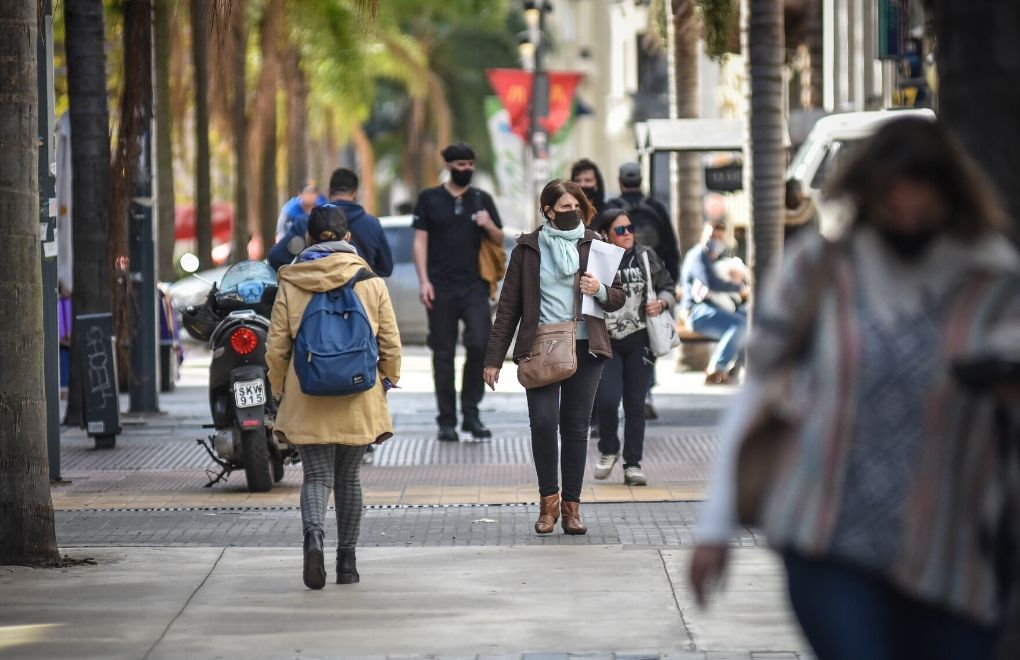PENNED BY PROF. ASLIHAN AYKAÇ
Post-Pandemic Possibilities: Global Backlash, the Nation-State or the Road to Socialism

* Photo: Anadolu Agency (AA) - Carlos Lebrato / Uruguay
It has been approximately five months since the first outbreak in Wuhan, China in December. What may seem to be a relatively long time for those under lockdown is only a moment in history, especially in political history. Still, those who were too eager to release their futuristic commentaries began with "the end of globalization" [1] and continued further with "the comeback of the nation-state". [2]
An alternative approach to these arguments was the emphasis on solidarity, collective action and a naive hope towards the rise of socialism. [3] These myopic visions require serious adjustment as history does not roll backwards, in other words, what is done cannot be undone and what is learned from historical experience cannot be unlearned.
The global spread of novel coronavirus (COVID-19) heavily altered global mobility of goods and services as well as people but to what extent it brought about an end to global interdependence, to financial transactions on a global scale is highly debatable.
True, the pandemic will change global mobility across the board, global trade will have to establish new rules and regulations in order to control for further spread. Global travel for all purposes but particularly tourism will have to make concrete, practical interventions in the conduct of business and in ways in which social contact takes place.
Furthermore, there will be dire need for economic policy, both by governments as well as the international organizations, to keep the global market open and roll the business of multinationals as usual.
Therefore, a sudden awakening towards the detrimental impact of neoliberal globalization and the global inequalities and interdependencies caused by it is highly unlikely at this stage. Instead, while the pandemic will put certain industries in jeopardy in terms of the economic performance, it will also generate ample amount of investment opportunity for other industries, including health care, pharmaceuticals, chemicals, cleaning industry and others, hence causing capital to move from one area to the other.
The pandemic will generate global risks and opportunities simultaneously, and as long as the systemic risk is cautiously managed, it is highly unlikely to end globalization.
The case for the nation-state
The problem about the comeback of the nation-state is that it disregards the essential problems regarding the historicity of the nation-state and the paradoxical position it found itself under globalization.
The emergence of the nation-state was not a linear historical transition or a coincidental invention, it was a political transformation, an adaptive strategy within the capitalist world economy to control the land, the people and the resources over a given territory. The legitimacy of this control was based on sovereignty, on people's will.
However, the political function of the nation-state and the legitimacy attributed to it have both been heavily altered with the onset of neoliberal globalization. Opening up of national borders for mobility of goods and services and people, deregulation on a macro scale, the minimal state model under the neoliberal rubric undermined the territorial sovereignty of the nation-state. The market rationale gained such a momentum that required nothing more than the administrative services of states.
More important than the conjunctural challenges posed by neoliberal globalization against the legitimacy of nation-states is the internal contradictions of the nation and the state juxtaposition. The nation and the state per se do not necessarily operate in a complementary manner. On the one hand, stateless people all around the world struggle for representation and political recognition; on the other hand, there are historically prevalent examples of states that build their nation through various social contracts that are not necessarily in congruence with the nation-building process. There are further cases of artificial states emerging as a result of decolonization and remapping of previously colonized regions.
Therefore, irrespective of neoliberal globalization in general and the pandemic challenges in particular, the nation-state as polity has problems of its own, significantly limiting its capacity for generating legitimacy.
Beyond its sui generis internal contradictions, the nation-state also suffers from operational limitations due to the crisis of liberal democracy. Several factors contribute to this crisis.
As states share a major portion of their sovereignty with supranational organizations, the input of citizens becomes further obsolete. Representative democracy fails because of its heavy reliance on elections rather than deliberation through parliamentary system. Political parties generally lack pluralism and internal democracy, hence become centers of chauvinistic, ideological power cliques rather than institutions of democratic participation. [4] In lack of free and fair elections, principles of transparency and accountability in political conduct and as nepotism replaces impartial, impersonal operation of the rule of law political conduct becomes redundant, and power in government becomes an end in itself rather than a means to an end. The simultaneous rise of far right governments, populist politics and authoritarian leaders in the US, Brazil, India or Turkey is by no means a coincidence; in fact, it's a consequence of the disconnection between economic globalization and political parochialism.
The policy responses to the pandemic is the most concrete evidence to expose the decline of the nation-state as a political model. In most cases, national level responses to the pandemic and the viral spread have failed to control the health hazards and the economic impact in the first instance, irrespective of the developmental levels of countries effected. Responses have varied in terms of their temporality and the extensive spatial coverage.
The UK response to control the spread was very much delayed and Boris Johnson personally suffered from wrong policy, the US death toll has been the price of a long-term neglect of social safety nets and extended health care coverage for a major segment of the society.
While Greece fared relatively better despite its slow recovery out of the economic crisis, Italy and Spain suffered heavy death tolls, also expecting an economic toll due to decline in industrial production and tourism.
Turkey's policy responses came early on and the extended public health care system became an asset under these circumstances, but the government has been criticized for not halting industrial production and exposing workers in construction, manufacturing and logistics to health hazards.
Granted that limited available information on COVID-19 prevented involved agencies and decision makers from imposing sound policy, it doesn't necessarily explain the limited scope of the national responses or the variation in policy approaches. Therefore, even for the single most important reason of inappropriate responses to the pandemic, the nation-state needs to be heavily scrutinized rather than propagated.
The road to socialism
The second line of argument that followed the end of globalization rhetoric focused on the intensifying solidarity networks due to the pandemic, the works of cooperatives and the dire need for collective action.
Zizek's hopes for some sort of communism to come back, while David Harvey sees the pandemic as an opportunity to focus on the collective possibilities towards building an alternative society.
This line of analysis is important for exposing the social repercussions of neoliberal globalization and directing people to think of the possibilities of re-organizing the economy in a more human manner, however, they are just as much myopic as those rallying for the comeback of the nation-state.
For one, it's hard to understand the source of optimism embedded in these arguments. While some solidarity networks existed prior to the pandemic, others have formed in a more or less spontaneous and haphazard way. Solidarity networks and collective action emerging due to the pandemic are very much spontaneous and it's very difficult to assess their sustainability and potential for structural transformation. For a deeper understanding, the impact of solidarity networks and their scope in terms of collective action has to be evaluated with more concrete indicators.
Whether we refer to collective action in general or to strategies towards socialism or communism in particular, the focus has to be on the dialectical processes that challenge capitalism on a systemic level and its internal contradictions.
The pandemic does not challenge the essential functions of capitalism, ceaseless accumulation of capital and unequal exchange, nor does it exacerbate the class conflict to the extent of a revolutionary overthrow.
On the contrary, the pandemic generates opportunities for new commodification processes, new ways in which flexible employment patterns could be extended for further exploitation and access to new markets that lack the necessary goods and services to fight against viral spread.
The collective action and solidarity networks emerging during the pandemic are motivated not by class dynamics or exploitation in the labor market but by social distancing and the immediacy caused by isolation.
This intensification of collective action and solidarity will definitely serve to be a learning process, but to what extent it will become a wave of anti-systemic movements remains to be seen.
A more appropriate line of reasoning needs to unravel the dynamics behind the relationship between the pandemic and capitalism. A major portion of the literature on the economic impact of the pandemic focus on an economic contraction, declining production, rising unemployment, and the fact that small producers will be hit the hardest. But as with any kind of crisis, there are winners and losers. Therefore, in addition to the losers, we need to look at the winners of the pandemic.
The race towards a cure shows that Big Pharma will be a winner. Even if the cure does not come up in the short run, it will still be a winner because of all the patients consuming the already available cure. Hospital sector will be a winner, especially in countries where governments lack the capacity to care for the massive rise in patients. In terms of health insurance, insurance companies may be losers in the immediate term, but they will probably be winners in the medium run, as more and more people will resort to private health insurance to avoid possible risks in the future.
As a spillover effect IT, software and programming will also be winners because of the emerging demand in sectors such as health care, education and transportation. In addition, new rules and regulations regarding social distancing, hygiene, health hazards, and workplace safety will seek innovative practices in service industries. The implications of this winner-loser scheme indicate a revitalization and restructuring in the market. Whether through government intervention or by way of private investment, there will be a shift in sectoral composition of the market.
Piketty draws attention to the need to invest in health and education sectors in the aftermath of the pandemic in order to recover for the social impact and for those who have been excluded from what remains of the social safety nets. The course of restructuring of the market will not take place free of government involvement or with total disregard of its social implications.
Acemoglu, also expecting a change in the relation between the state and the economy, argues for dynamic monetary policy, tax policy and expenditure policy as well as strong support for the supply chain.
Milanovic, cautions for social collapse that might follow and economic collapse. If the crisis lasts long and globalization unravel it might also lead to social disintegration. Milanovic states that those who are not fully specialized and dependent on the market for sustenance are better off because they do not depend on goods and services provided by others in the market, which also carries the risk of infection.
Therefore, a comprehensive evaluation of the economic consequences of the pandemic has to take into consideration the possible collapse with the probable success, as well as all parties involved either of these forecasts.
Towards a future unknown
Globalization is facing a major backlash and it will significantly change the global mobility of goods, services and the people. However, the global operation of the economy through flexible specialization and its interconnectedness through global value chains [5] suggests that economic units of various sizes and scopes are heavily dependent on global economic networks. To carry Milanovic's argument to the macroeconomic scale, economies heavily specialized within the global division of labor will find it extremely difficult to go back to a protected national scale.
Global trade will face major difficulties, but as long as demand will be maintained on a global scale, the supply will have to match. Global mobility of people, whether for business or for leisure, will not resume until the necessary measures against infection risk are well established.
The future of the nation-state depends on its capacity to politically reconcile a social contract that will serve as its source of legitimacy. Such a social contract will include cultural as well as economic interests of parties involved. Instead of a short-sighted return to the nostalgic days of the previous century, a well-informed analysis on the needs and demands of the contemporary society will provide greater insight on the future of the polity in general and the nation-state in particular.
A collective, solidaristic alternative becoming a structural challenge to the existing order can materialize if and only if the essential principles of capitalism, including private property, the accumulation process and unequal exchange is replaced by an overarching acceptance of the commons, a need based economy that refuses artificial demand generation and a market that focuses on de-cent life standards for all rather than profit maximization. Beyond that, any aspiration towards socialism or communism will turn out to be nothing but romancing the past.
All in all, the pandemic will change social organization, economic operations and political conduct significantly. The proper response to such widespread change lies not in the past but in the future, built by proper insight, efficient analysis and comprehensive planning. (AA/SD)
Sources:
[1] Irwin, Neil, It's the End of the World Economy as We Know It, New York Times, 20.4.2020, https://www.nytimes.com/2020/04/16/upshot/world-economy-restructuring-coronavirus.html.
[2] Rachman, Gideon, Nationalism is a Side Effect of Coronavirus, Financial Times, 23.3.2020, https://www.ft.com/content/644fd920-6cea-11ea-9bca-bf503995cd6f?fbclid=IwAR2umIDI6GWFkYP3JsbavT9p2rEJOy1oAN_GITTSitAblk2LLp-acs37av0.
[3] Buiter, Willem H., Pandemic Socialism, Project Syndicate, 9.4.2020, https://www.project-syndicate.org/commentary/covid19-pandemic-requires-socialism-by-willem-h-buiter-1-2020-04.
[4] The debate on globalization and democracy could be extended, for further inquiry see Held, Da-vid, Democracy and the Global Order, Polity Press, 1995.
[5] Gereffi, Gary, Global Value Chains and Development: Redefining the Contours of 21st Century Capitalism, Cambridge University Press, 2018.
About Aslıhan AykaçShe received her BA degree at Boğaziçi University on Political Science and International Relations. She completed her graduate studies in Sociology at Binghamton University. Her dissertation was translated and published in Turkish as Yeni İşler, Yeni İşçiler [New Jobs, New Workers] by İletişim Publications. She was granted funding by the Middle East Research Competition in 2007 and her research on a comparative analysis of the social security reform and its impact on the labor market in Turkey was published by Toplum ve Bilim, A well-known journal on Turkish studies. She was a Fulbright Grantee at Rutgers University for the academic year 2014-2015, and her research was published by Routledge Books in 2017, with the title Political Economy of Employment Relations: Alternative Theory and Practice. The same book was translated into Turkish and published by Metis Books in 2018. She is currently teaching at Ege University, Department of International Relations. |







